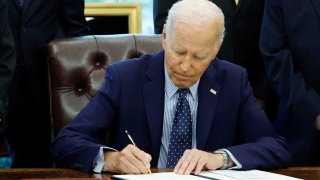No Man of Steel
By blocking the Nippon-U.S. Steel merger, the outgoing president handed Beijing another win.
In his final days in office, President Biden outdid himself by harming America’s national security. After a series of foreign policy failures and foibles spanning Afghanistan, Ukraine, the Middle East, and the South China Sea over the past four years, he finishes his tenure by releasing Yemeni militants from Guantanamo, weakening our economic resilience by restricting domestic energy production, as well as throwing America’s key ally, Japan, under the proverbial bus.
After more than a year since the announcement of the proposed merger between U.S. Steel (USS) and Nippon Steel, President Biden blocked the deal at the eleventh hour of his presidency under the false pretense of a national security risk. His precipitous move is reminiscent of his calamitous decision to pull out of Afghanistan without considering the impact on our allies. He leaves our closest ally, home to more U.S. military personnel than any other country in the world, reasonably wondering about how this could have happened—so much for his past vaunted cries of “America’s back” that were intended, falsely, to impugn President Trump’s foreign policy record.
Beijing benefits politically from the merger’s failure, as it directly feeds into China’s propaganda that paints America as fickle to allies and opposed to free trade. Even before this deal, Chinese media consistently argued that America stands in the way of its allies instead of working with them. State media also frequently criticizes us for its increasingly protectionist policies that undermine the free trade principles that we purport to champion. The most recent example of the CCP’s anti-U.S. smear campaign considering Biden’s decision came in an article penned in China Daily, a state-owned news outlet, which stated that “being an enemy of the U.S. is potentially dangerous, but being its ally is harmful in actuality.”
China dominates the global steel industry. Thanks to its low labor costs, economies of scale, and government support via subsidies and state-owned enterprises, China accounts for more than half of the world’s crude steel production. Six of the world’s top ten steelmakers are Chinese firms, with four of them known to be state-owned, all with direct ties to the Chinese Communist Party (CCP).
And China does more than just dominate this sector; it also manipulates the market. With Beijing’s support, Chinese steelmakers often produce more steel than the current global demand can absorb, resulting in the dumping of low-quality steel at importers, including the United States. Experts have pointed to this overcapacity as an intentional move by China to manipulate the global steel market to hurt its competitors, like U.S. Steel, which has long suffered from a market-wide decline in steel demand.
Therefore, it is not a far stretch to claim that the Chinese steelmakers are, by extension, a coercive tool for the CCP against the rest of the world. This is a status quo that the United States and our partners must challenge if we are serious about competing with Beijing.
Unfortunately, President Biden’s actions make it harder to challenge this status quo by harnessing the U.S.-Japan alliance in economic and commercial domains. The combined company would have overtaken Chinese state-owned Ansteel Group as the third largest steelmaker in the world, taking a step towards denting China’s global steel hegemony.
Fortunately, the Biden debacle is almost over, and there will be opportunities to correct his mistakes. President Trump has already announced plans by SoftBank, another Japanese company, to invest $100 billion in U.S. projects over the next four years. A second look at the proposed U.S.-Nippon Steel deal could augur well given the commercial context, competition with China, and re-establishing trust and transparency in the U.S. legal system, given the Biden administration’s shenanigans. The recent decision to delay the implementation of the Biden block until June offers a second chance to get America the best deal possible.
Pushing back against China’s power, influence, and malign activities will undoubtedly be one of the key themes in President Trump’s second term as POTUS. Doing this in conjunction with a key ally such as Japan will not only Make America Great Again but also Make Alliances Great Again.
Heino Klinck was the Deputy Assistant Secretary of Defense for East Asia, 2019–21.
Image: Anna Moneymaker / Shutterstock.com.

